
In a special lecture assembly, QE’s younger boys learned the shocking truth about the loss of biodiversity and then discovered what they could do to support the natural environment.
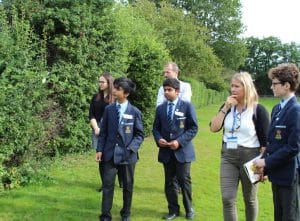 Lesley Malpas, Founder and Chief Executive of not-for-profit organisation, Operation Future Hope, not only outlined problems around the world, but also examined environmental depredation close to home, explaining that Britain suffers some of the world’s worst biodiversity loss.
Lesley Malpas, Founder and Chief Executive of not-for-profit organisation, Operation Future Hope, not only outlined problems around the world, but also examined environmental depredation close to home, explaining that Britain suffers some of the world’s worst biodiversity loss.
More positively, in keeping with the name of her organisation, she highlighted case studies of successful examples of rewilding, while setting out some suggestions for measures the boys could take locally, again with a particular focus on rewilding.
After the lecture, members of QE’s new Green Council took her on a tour of the site to consider what further steps the School might itself take to build on its current success in supporting nature.
Crispin Bonham-Carter, Assistant Head (Pupil Involvement) said: “I am grateful to Lesley for sharing her expertise and delivering such a motivating assembly: I know the boys were inspired by the concept of rewilding, both at a local level, including here at the School, and more broadly across the UK and the world.
“With next month’s COP26 climate change summit in Glasgow currently in everyone’s mind, we are finding boys throughout the School are highly engaged as we explore environmental issues and look at potential solutions through our enrichment programme and through normal lessons as well.”
Lesley related some stark statistics and shocking stories to convey the gravity of the problem. She stated that:
- 200 species are lost globally every day
- Drinks company Pepsico annually uses 457,200t of palm oil, while it provides no evidence that the oil’s production has been achieved without deforestation
- Britain occupies an unenviable position as the 29th worst-performing country globally (out of 218) in terms of depleted biodiversity
- Since 1980, 420 million birds have disappeared from the British countryside, together with 75% of invertebrates.
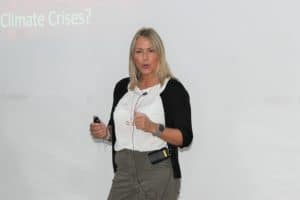 Her positive stories of rewilding included the reintroduction of beavers in Britain, the transformation of what was previously an intensive dairy farm into a wildlife haven that now boasts owls, bats and nightingales in abundance, and the steps taken by a number of schools to improve their sites.
Her positive stories of rewilding included the reintroduction of beavers in Britain, the transformation of what was previously an intensive dairy farm into a wildlife haven that now boasts owls, bats and nightingales in abundance, and the steps taken by a number of schools to improve their sites.
On the tour of QE’s grounds following the assembly, five Green Council members from Year 8 (Zane Shah; Benjamin Newton; Jeevan Karthick Thiyagarajan; Jalal Ud-Din Farooq and Shashank Devaguptapu) showed her around, accompanied by Extra-curricular tutor Stephanie Tomlinson, who runs the School’s Eco-Network, Mr Bonham-Carter and Matthew Rose, Executive Assistant to the Headmaster and Head of Project Support Services.
Lesley explained to the party that in many cases, supporting nature better would be about doing less – allowing hedges to grow out a little, for example – and allowing nature to take its course in locations such as the periphery of fields where space is not being used.
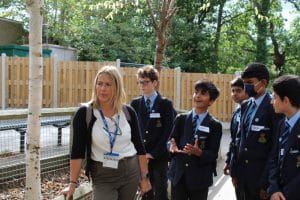 “There seemed to be lots of scope for small initiatives that could have a positive impact and would allow interested students to get actively involved in the School’s stewardship of its grounds,” said Mr Bonham-Carter. “Generally, the site is already supporting nature quite well, she explained, so we are starting this project from a good place. We look forward to receiving her report and understanding further what would be achievable on our campus.”
“There seemed to be lots of scope for small initiatives that could have a positive impact and would allow interested students to get actively involved in the School’s stewardship of its grounds,” said Mr Bonham-Carter. “Generally, the site is already supporting nature quite well, she explained, so we are starting this project from a good place. We look forward to receiving her report and understanding further what would be achievable on our campus.”
The School’s new four-year development plan includes a commitment to “exercise good environmental stewardship” and to “instil a sense of responsibility for the environment in the boys”.

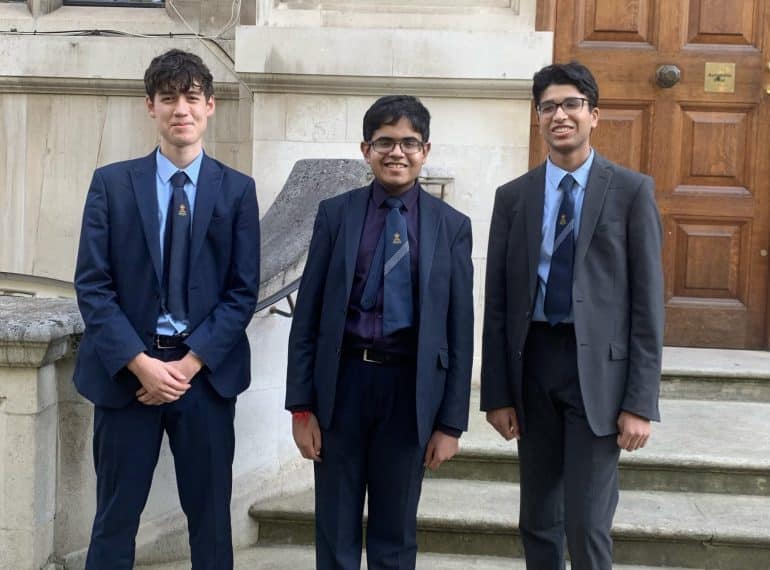
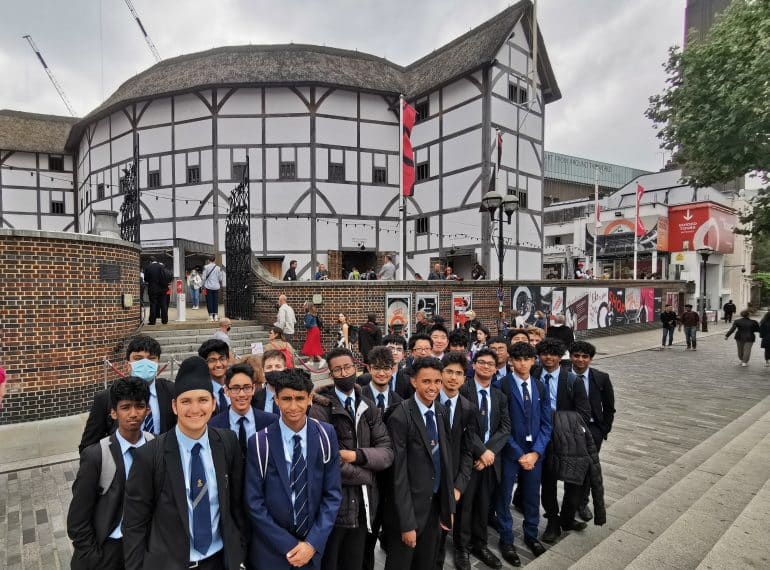
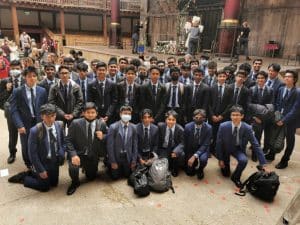 During the visit – QE’s first live theatre visit since before the pandemic – all of Year 11 experienced a radical take on Shakespeare’s tragic tale of two young Italian ‘star-crossed lovers’ that eschewed romance in favour of an unsparing focus on mental health.
During the visit – QE’s first live theatre visit since before the pandemic – all of Year 11 experienced a radical take on Shakespeare’s tragic tale of two young Italian ‘star-crossed lovers’ that eschewed romance in favour of an unsparing focus on mental health. Throughout the play, the boys stood in the theatre yard, or pit – the area which in Elizabethan times was the cheapest part of the theatre, with no seats provided. “This meant that sometimes the actors were moving between groups of students as they performed,” said Mr King.
Throughout the play, the boys stood in the theatre yard, or pit – the area which in Elizabethan times was the cheapest part of the theatre, with no seats provided. “This meant that sometimes the actors were moving between groups of students as they performed,” said Mr King.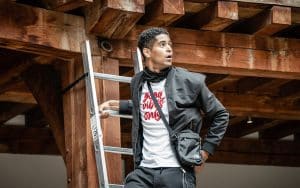 For his part, TimeOut’s Andrzej Lukowski’s said: “…I thought the billboard was an interesting idea in a mercurial show that often manages to be frustratingly dysfunctional and giddily fun at the exact same time….Essentially Ince’s desire to offer up two hours of hard-hitting social realism and two hours of wild escapist fantasy at the same time is not entirely reconcilable. Kitchen sink regietheatre* isn’t really a thing. But just because it doesn’t always ‘work’ doesn’t mean it’s not good: I loved the wild, irreverent roar of the ball [the scene in which Romeo first sees Juliet]; equally, I think Ince is on to something in choosing to earnestly highlight the number of references to suicide in the play – it seems quite reasonable to interpret the star-cross’d lovers as being depressed.”
For his part, TimeOut’s Andrzej Lukowski’s said: “…I thought the billboard was an interesting idea in a mercurial show that often manages to be frustratingly dysfunctional and giddily fun at the exact same time….Essentially Ince’s desire to offer up two hours of hard-hitting social realism and two hours of wild escapist fantasy at the same time is not entirely reconcilable. Kitchen sink regietheatre* isn’t really a thing. But just because it doesn’t always ‘work’ doesn’t mean it’s not good: I loved the wild, irreverent roar of the ball [the scene in which Romeo first sees Juliet]; equally, I think Ince is on to something in choosing to earnestly highlight the number of references to suicide in the play – it seems quite reasonable to interpret the star-cross’d lovers as being depressed.”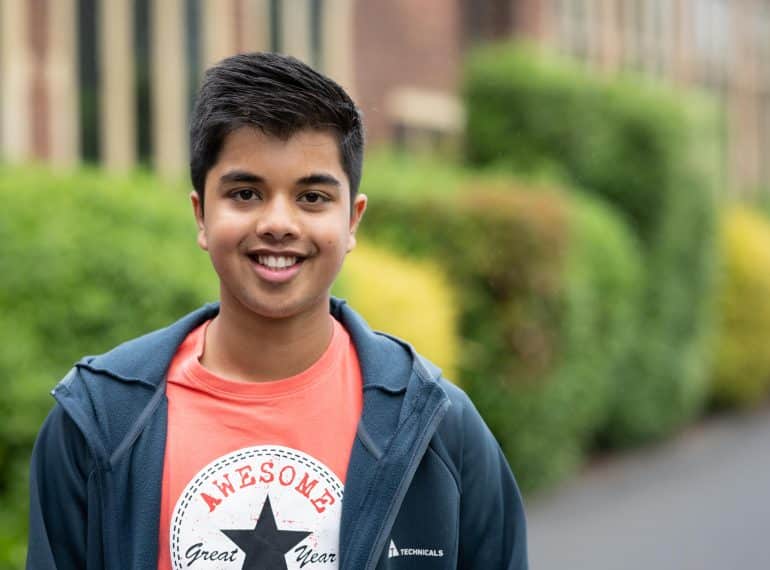
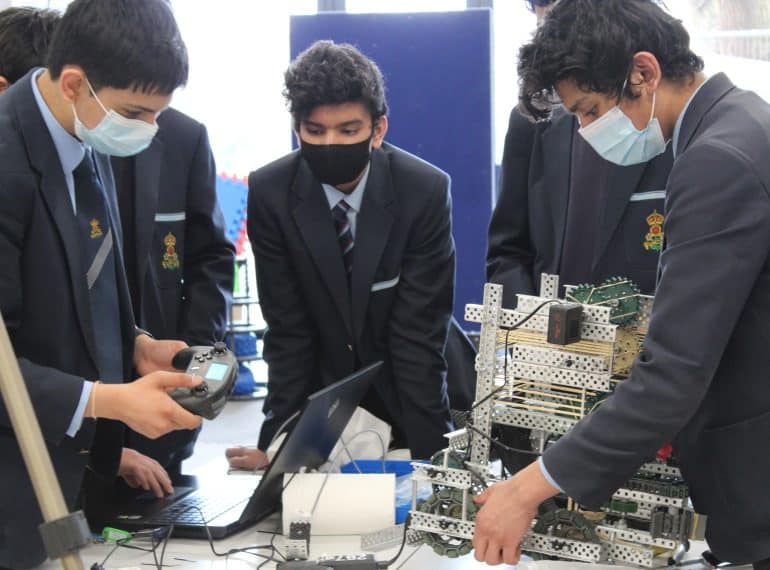
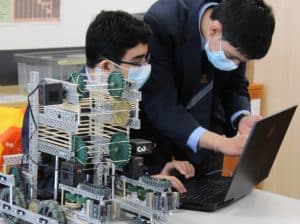 Building on QE’s strong international reputation in robotics established over the past five years, four senior and five junior teams qualified for the global VEX finals, which are usually held in the US but this year were run online because of the pandemic. Teams also took the opportunity to compete in offline, in-person events locally, including one hosted by QE.
Building on QE’s strong international reputation in robotics established over the past five years, four senior and five junior teams qualified for the global VEX finals, which are usually held in the US but this year were run online because of the pandemic. Teams also took the opportunity to compete in offline, in-person events locally, including one hosted by QE.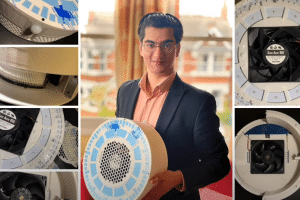 At a VEX IQ Showcase held at QE, Gearsquad not only won the Teamwork award – jointly with GCA Gearers, a team from Greig City Academy in Haringey – but also took the Excellence award, as a result of which they have already qualified for next year’s world championships.
At a VEX IQ Showcase held at QE, Gearsquad not only won the Teamwork award – jointly with GCA Gearers, a team from Greig City Academy in Haringey – but also took the Excellence award, as a result of which they have already qualified for next year’s world championships. The pairing of Dhruv Syam and Ashwin Sridhar (now Year 12) – Team Salutem Validus – reached the final of the Amazon Longitude Prize Explorer competition with DevSalutem, their AI-powered wellbeing assistant with a companion app.
The pairing of Dhruv Syam and Ashwin Sridhar (now Year 12) – Team Salutem Validus – reached the final of the Amazon Longitude Prize Explorer competition with DevSalutem, their AI-powered wellbeing assistant with a companion app.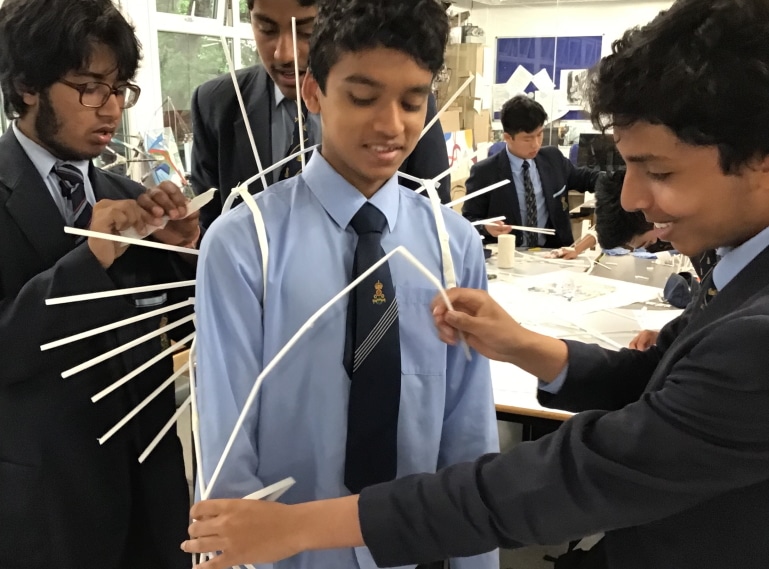
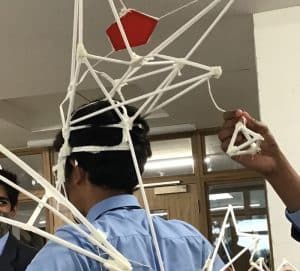 For Year 10, the brief was to work in groups to design and construct ‘wearable architecture’, using 6mm paper tubes.
For Year 10, the brief was to work in groups to design and construct ‘wearable architecture’, using 6mm paper tubes.